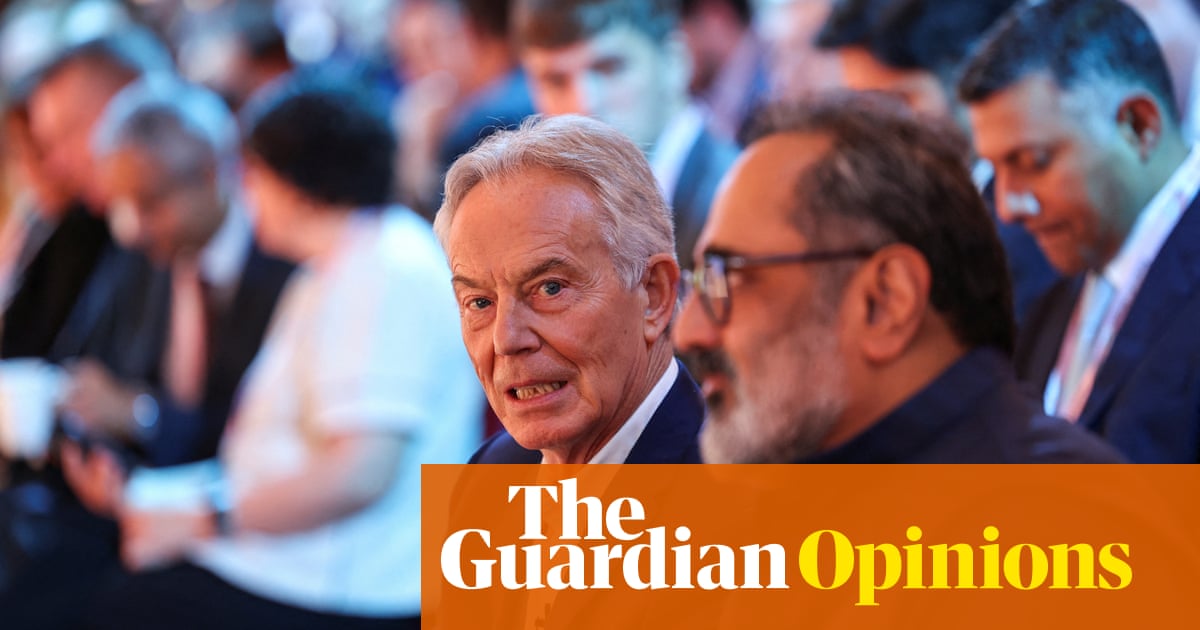When Tony Blair came out this week to say current net zero policies were “doomed to fail”, there was something familiar in his arguments: phasing out fossil fuels wouldn’t work because people perceived it as expensive, arduous and not their problem. Stop banging on about renewables; won’t someone think of the things wedon’tknow how to do, like carbon capture and such wizardry as is still locked in tech bros’ imaginations? Basically, net zero had lost the room, according to the former prime minister. And if anyone knows where the room is, and how to get it back, it must be him.
He said something similar about “woke”, which sadly lost the room in 2022. “Plant Labour’s feet clearly near the centre of gravity of the British people,” Blair advised Starmer. “[They] want fair treatment for all and an end to prejudice, but distrust and dislike the ‘cancel culture’, ‘woke’ mentality.” What exactly does “woke” mean, if not an end to prejudice? Just how effective is cancel culture, if Blair himself could work as a lobbyist for aSaudi oil firm in 2016,advised the government of Kazakhstanafter it brutally suppressed public protests in 2011, and yet still walks among us as the voice of the progressive left? Memo to my fellow cancellers: we are bad at this.
Two years later, just after the general election, Blair wasvictorysplaining the populist rightto Keir Starmer: you don’t beat them by arguing with them. “To close off their avenues for increasing support, you’ve got to deal with the grievance.” In practice, this means meeting them halfway on immigration. Promise to cut it, promise to be tough on it, promise to make migrants’ lives as hard as they possibly can be – and Blair has form, here, of course, as the instigator of the life-altering policy ofdenying asylum-seekersthe right to work. The funny thing about meeting populists halfway is that it never works; it almost seems to drive them further into the reaches of their extremism, just to get away from you.
But no time! Because net zero extremists are coming for the progressive cause, and the sensible centre needs to head them off at the pass. This issue differs from immigration, in so far as there’s no easy out-group (unless you count “supporters of net zero”), and differs from “woke” in so far as it has a meaning, one that the climate journalist James Murray has handily recapped: “Net zero is a scientific term referring to the balance of anthropogenic emissions and carbon sinks required to stop temperatures spiralling out of control, bringing with them drastically increased risk of food insecurity, catastrophic weather and civilisation-level disaster.” There is no happy medium, where ordinary people get to have slightly less net zero and lower bills. There is only action that is fast enough or not, and political decisions that distribute the cost of that action fairly or not.
Many situate Blair’s otherwise incomprehensible position with the allegiance of his largest donor, Larry Ellison, a Trump-affiliated tech billionaire who, as of January 2024,had given $100mto the Tony Blair Institute and pledged to take his donations up to $375m. Don’t panic, anyone; Ellison also spent $200m building aJapanese-inspired villa in Palo Alto. It’s just not that much money to Ellison, so he could easily have bunged it to a mate and not intended to derail any nation’s environmental policies, least of all one as tiny as ours. It makes no sense, he’s not a fossil fuels guy, why would he oppose net zero? Maybe he’s lobbying for tech optimism, maybe he’s working against state regulation. Either way, you didn’t vote for him, nor could you.
There’s a more soothing theory still, which is that Blair has always pushed corporate interests and had a deep distaste for grassroots movements for social change. There’s a direct through-line, from the man whopushed PFIand was rumoured to have banned beards on the frontbenches, to the man who finds everything, including wildlife and clement weather, too woke.
The last person to voice this anti-net zero position was, of course, Kemi Badenoch. She was asked at a conference in March, by someone who worked at the Eden Project, the only two cogent questions I heard anyone put to her: on what scientific basis did sheresile from the 2050 target? And what would she like the target to be instead? She had no answer at all to the first, and to the second, something whimsical and impressionistic: “Why did we set the target at 2050? Why not 2051, why not 2049? Because there was a zero at the end of the year, not because there was a clear plan.” It was unprepared, undergrad stuff; this politician alone could not hold back the energy for action on climate.
That’s what’s often so chilling about anti-climate action – the case for change is so established that you expect its opponents to be at the top of their game, to have an argument so strong that it had never occurred to a waiting world; you expect them to be extraordinary. When they aren’t, it’s as if their paymasters are just dialling it in, because they’ve already won.
The do-nothing lobby needs as many voices as it can get: the upstart, the elder statesman, the right, the centre, the household name, the maverick, the lot. Those of us who would prefer to do something, to halt climate change, need to situateTony Blaircorrectly: he’s not the charmer of crowds in the service of low-key progressive medicine they might not otherwise swallow. He’s part of a different chorus; you can call it “corporate”, you can call it the “tech broligarchy”, but you can’t keep calling it the “left”.
Zoe Williams is a Guardian columnist
Do you have an opinion on the issues raised in this article? If you would like to submit a response of up to 300 words by email to be considered for publication in ourletterssection, pleaseclick here.
